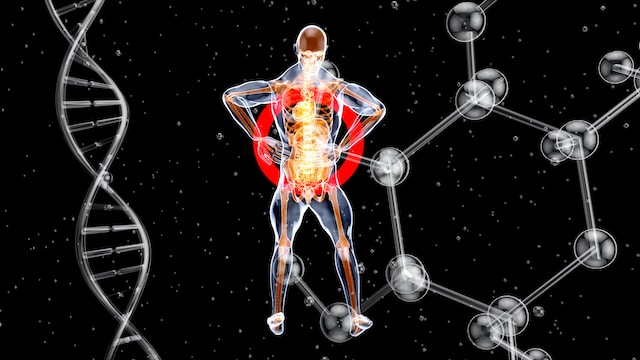
The Science Behind Aging: How to Slow Down the Process
Aging is an inevitable part of life. As we grow older, our bodies undergo a series of changes at the cellular and molecular levels, leading to visible signs of aging.
Wrinkles, gray hair, and decreased physical and cognitive abilities are all manifestations of this natural process.
Given the emphasis on youth and vitality in society, it is understandable why there is such a strong desire to stop aging in so many people.
While we may not be able to completely halt the march of time, there are scientifically supported strategies that can help us age more gracefully and maintain our health and well-being as we grow older.
In this blog post, we’re going to talk about the fascinating science of aging, explore the biological factors that contribute to it, and provide practical tips on how to slow down the aging process and achieve healthier, more youthful skin. Let’s begin our journey.
Understanding the biology of aging:
Telomeres and the Ageing Cell:
Telomeres, the protective caps at the ends of our chromosomes, play a crucial role in cellular aging. These repetitive DNA sequences prevent the loss of important genetic material during cell division.
However, with each cell division, telomeres gradually shorten, eventually leading to cellular senescence and aging. Understanding the factors that influence telomere length and exploring ways to preserve their integrity can have a significant impact on the aging process.
Telomeres as protective caps:
of telomeres as the plastic tips on shoelaces that prevent them from tearing. Like this, telomeres protect our chromosomes from degradation and maintain their stability.
They act as a buffer, ensuring that important genetic information is not lost during replication.
Telomere shortening and cell division:
Every time a cell divides, telomeres become slightly shorter. This is due to the inability of DNA replication machinery to fully replicate the ends of chromosomes.
Over time, as telomeres reach a critically short length, cells can no longer divide and function properly. This cellular senescence contributes to the overall aging process.
Oxidative stress and aging:
Another key player in the science of aging is oxidative stress. This occurs when there is an imbalance between the production of reactive oxygen species (ROS), also known as free radicals, and the body’s ability to neutralize them with antioxidants.
Free radicals are highly reactive molecules that can damage cells and their components, including DNA, proteins, and lipids. The cumulative effects of oxidative stress can accelerate the aging process.
Role of free radicals:
Free radicals are natural byproducts of cellular metabolism. They are produced during various physiological processes, such as energy production and immune system activation.
However, excessive production of free radicals or a decrease in the body’s antioxidant defenses can lead to oxidative stress.
Free radicals can cause damage to cellular structures and promote aging at the molecular level.
The body’s defense against oxidative stress:
Fortunately, our bodies possess a defense system against oxidative stress. Antioxidants, both endogenous (produced by the body) and exogenous (obtained from our diet), neutralize free radicals and minimize their harmful effects.
Antioxidant-rich foods, such as fruits, vegetables, and certain spices, can provide us with a good supply of these protective compounds.
Additionally, lifestyle choices, such as avoiding smoking and reducing exposure to environmental toxins, can further support our body’s defense against oxidative stress.
Lifestyle factors that affect aging:
Nutrition and diet:
Proper nutrition plays a vital role in healthy aging. The food we consume provides the necessary nutrients to support cellular function and repair.
Caloric intake and nutrient density are two important factors to consider. While excessive calorie consumption can contribute to weight gain and age-related diseases, a well-balanced diet that includes a variety of nutrient-rich foods can provide the building blocks for optimal cellular health.
Caloric intake and nutrient density:
Caloric intake refers to the number of calories consumed in a day, while nutrient density refers to the number of essential nutrients per calorie in a given food.
Maintaining a balanced caloric intake that satisfies our body’s energy requirements without going overboard can help us age optimally.
Additionally, choosing nutrient-dense foods ensures that we obtain the necessary vitamins, minerals, antioxidants, and other bioactive compounds to support our overall health.
Anti-aging foods and antioxidants:
Certain foods have gained attention for their potential anti-aging properties. These include colorful fruits and vegetables, whole grains, lean proteins, and healthy fats.
These foods are rich in antioxidants, which help combat oxidative stress and reduce the risk of age-related diseases.
Including a variety of these foods in our diet can provide a wide range of beneficial compounds that support healthy aging.
Exercise and physical activity:
Regular exercise is not only important for maintaining physical fitness but also for healthy aging. Engaging in physical activity has been shown to have numerous benefits, including improved cardiovascular health, enhanced cognitive function, and increased muscle strength and flexibility.
Benefits for healthy aging:
Exercise stimulates the production of endorphins, known as “feel-good” hormones, which can improve mood and overall well-being. It also helps maintain a healthy weight, reduces the risk of chronic diseases such as heart disease and diabetes, and promotes better sleep quality.
Furthermore, physical activity can support brain health by promoting neuroplasticity and reducing the risk of cognitive decline.
Types of exercises for longevity:
To reap the full benefits of exercise for healthy aging, it’s important to engage in a combination of aerobic, strength, and flexibility exercises.
Aerobic exercises, such as walking, jogging, or cycling, help improve cardiovascular health and endurance.
Strength training, which involves resistance exercises, helps maintain muscle mass and bone density.
Flexibility exercises, such as yoga or stretching, enhance joint mobility and reduce the risk of injuries.
Managing stress for healthy aging:
Impact of chronic stress on aging:
Chronic stress can have detrimental effects on both our physical and mental well-being, contributing to the aging process.
Prolonged exposure to stress hormones, such as cortisol, can disrupt various physiological processes and accelerate cellular aging.
Stress hormones and their effects:
When we experience stress, the body releases hormones, including cortisol, as part of the “fight-or-flight” response.
While this response is necessary in acute situations, chronic stress can lead to persistently elevated levels of stress hormones.
Over time, this can result in inflammation, impaired immune function, and increased oxidative stress, all of which contribute to accelerated aging.
Strategies to reduce stress and promote relaxation:
Managing stress is crucial for healthy aging. Various strategies can help reduce stress levels and promote relaxation.
These include regular exercise, deep breathing exercises, meditation, mindfulness practices, engaging in hobbies or activities that bring joy, and cultivating a strong support network of friends and family.
Implementing stress management techniques into our daily routine can significantly improve our overall well-being and slow down the aging process.
Sleep and its role in aging:
Importance of quality sleep:
Getting adequate and quality sleep is essential for optimal health and healthy aging. During sleep, the body repairs and regenerates tissues, consolidates memories, and regulates various physiological processes.
Lack of quality sleep can have detrimental effects on both physical and cognitive health, leading to an accelerated aging process.
Sleep deprivation and aging:
Chronic sleep deprivation has been linked to a wide range of health issues, including cardiovascular diseases, obesity, weakened immune function, and cognitive decline.
It can also contribute to the development of dark circles, fine lines, and wrinkles, which are visible signs of premature aging.
Prioritizing sleep and establishing healthy sleep habits are important steps in slowing down the aging process.
Tips for improving sleep quality:
To improve sleep quality, it’s important to create a conducive sleep environment and establish a consistent sleep routine.
This includes ensuring a comfortable bed, reducing exposure to electronic devices before bedtime, avoiding stimulants like caffeine and nicotine close to bedtime, and practicing relaxation techniques such as a warm bath or reading a book.
Additionally, maintaining a regular sleep-wake schedule, even on weekends, can help regulate the body’s internal clock and promote better sleep quality.
Maintaining brain health for longevity:
Cognitive decline and aging: One of the concerns associated with aging is the potential decline in cognitive function. While it’s normal for certain cognitive abilities to change with age, there are ways to promote brain health and reduce the risk of age-related cognitive decline.
Neuroplasticity and brain health:
The brain has a remarkable ability to adapt and change throughout our lives, known as neuroplasticity.
Engaging in activities that stimulate the brain, such as learning new skills, solving puzzles, or playing musical instruments, can promote neuroplasticity and help maintain cognitive function as we age.
Mental stimulation and brain exercises:
Just as physical exercise is important for maintaining physical health, mental exercise is crucial for brain health.
Engaging in activities that challenge the brain, such as reading, learning a new language, playing strategy games, or practicing mindfulness, can help preserve cognitive function and support healthy aging.
Genetic factors in aging:
Understanding genetic predispositions:
Genes play a significant role in the aging process, influencing how we age and our susceptibility to certain age-related conditions.
While we can’t change our genetic makeup, understanding our genetic characteristics may help us make informed choices about our lifestyle and healthcare to optimize healthy aging.
Longevity genes and implications:
Certain genes, often referred to as “longevity genes,” have been associated with a longer lifespan and healthier aging.
These genes can influence various factors, including inflammation, cellular repair mechanisms, and the body’s response to stress.
Studying the function of these genes provides insights into the biological mechanisms of aging and offers potential targets for interventions.
Genetic testing and personalized interventions:
Genetic testing, such as DNA sequencing, can provide individuals with information about their genetic predispositions and susceptibility to certain age-related conditions.
This knowledge can guide personalized interventions, such as lifestyle modifications, targeted therapies, or preventive screenings, to promote healthy aging and mitigate potential risks.
Hormonal changes and their effects on aging:
Role of hormones in the aging process:
Hormones play a crucial role in regulating various physiological processes in the body, including growth, metabolism, reproduction, and immune function.
As we age, hormonal changes occur, which can impact our overall health and contribute to the aging process.
Declining hormone levels and impacts:
With age, the production and regulation of hormones decline. For example, menopause in women is marked by a decrease in estrogen and progesterone levels, while men experience a gradual decline in testosterone levels.
These hormonal changes can lead to a range of symptoms and age-related conditions, including reduced bone density, muscle loss, cognitive changes, and decreased libido.
Hormone replacement therapy options:
Hormone replacement therapy (HRT) is an option for individuals experiencing significant hormonal imbalances or deficiencies.
HRT involves the administration of hormones to supplement or replace those that are no longer adequately produced by the body.
However, the decision to pursue HRT should be made in consultation with healthcare professionals, considering individual health needs, potential risks, and benefits.
Environmental factors and aging:
Effects of toxins and pollutants:
Our environment is filled with toxins and pollutants that can contribute to the aging process. Exposure to environmental pollutants, such as air pollution, heavy metals, pesticides, and chemicals in household products, can lead to cellular damage, inflammation, and accelerated aging.
Cellular damage and aging:
Toxins and pollutants can directly damage cellular components, including DNA, proteins, and lipids. This damage accumulates over time and contributes to cellular dysfunction, inflammation, and increased oxidative stress. Minimizing exposure to environmental toxins is crucial for healthy aging.
Strategies for reducing exposure:
While it may be impossible to completely avoid exposure to environmental toxins, there are steps we can take to reduce our exposure.
These include using natural and non-toxic cleaning products, filtering indoor air, consuming organic foods, and being mindful of potential environmental hazards in our surroundings.
Additionally, supporting initiatives that promote clean air, water, and sustainable practices can contribute to a healthier environment for ourselves and future generations.
Anti-aging therapies and research:
Current interventions and emerging technologies:
The field of anti-aging research has seen significant advancements in recent years. Numerous interventions and technologies show promise in slowing down the aging process and promoting healthy longevity.
From caloric restriction and intermittent fasting to the development of anti-aging drugs and therapies, scientists are continuously exploring new avenues to extend the health span.
Caloric restriction and intermittent fasting:
Caloric restriction, or reducing calorie intake without malnutrition, has been shown to extend the lifespan and improve health outcomes in various organisms.
Intermittent fasting, which involves alternating periods of fasting and eating, has also gained attention for its potential anti-aging effects.
These dietary interventions activate cellular repair mechanisms and enhance metabolic efficiency.
Advancements in anti-aging research:
Beyond dietary interventions, researchers are investigating various compounds and therapies that have the potential to slow down the aging process.
This includes the use of senolytics, which target and eliminate senescent cells, as well as the exploration of regenerative medicine, stem cell therapies, and gene editing technologies.
While many of these treatments are still in the experimental stage, they hold promise for the future of anti-aging research.
Positive mindset and social connections:
Psychological aspects of aging:
A positive mindset and social connections have been shown to have a significant impact on healthy aging. Our attitudes, beliefs, and social interactions influence our well-being and can contribute to a longer, more fulfilling life.
The power of positive thinking:
Having a positive outlook on life can improve overall mental and physical health. Positive thinking can reduce stress, boost the immune system, and enhance resilience in the face of challenges.
Cultivating gratitude, practicing mindfulness, and engaging in positive self-talk are strategies that can promote a positive mindset and support healthy aging.
Building meaningful relationships:
Maintaining social connections and nurturing meaningful relationships is crucial for healthy aging. Engaging in social activities, participating in community groups, and staying connected with friends and family can provide emotional support, reduce feelings of loneliness, and promote a sense of belonging.
These social connections contribute to overall well-being and have been linked to better cognitive function and longevity.
Conclusion:
Aging is a complex process influenced by many factors, including genetics, lifestyle choices, and skincare practices. Aging, my friends, is an inevitable and organic facet of our existence that we must come to terms with.
By understanding the science behind aging, we can make informed decisions and adopt strategies to slow down the process and maintain youthful, vibrant skin
Incorporating these strategies into our daily lives can help us age gracefully, maintain vitality, and enjoy a high quality of life throughout the aging process.
Let’s embrace the science of aging and take proactive steps to nurture our physical, mental, and emotional well-being for a fulfilling and vibrant journey of healthy aging.
In the post, I’ve covered all the necessary details. If you have any further questions or need more information, please feel free to leave a comment below.
It is important to note that the content of this blog is intended for informational purposes only and should not be considered a replacement for professional medical advice.


You May Also Like
The Ultimate Guide For The Perfect Smokey Eye
11 April 2024
The Remarkable Benefits of Coconut Oil
2 January 2025

